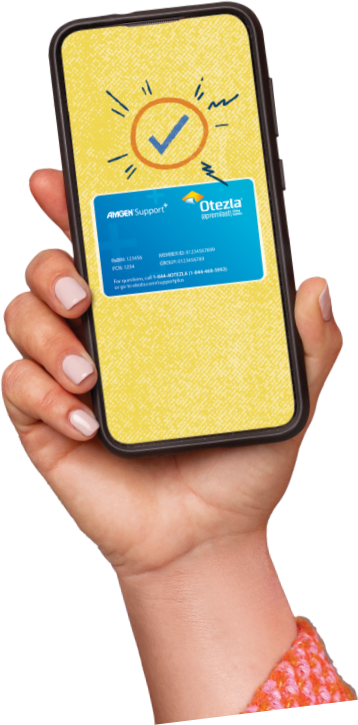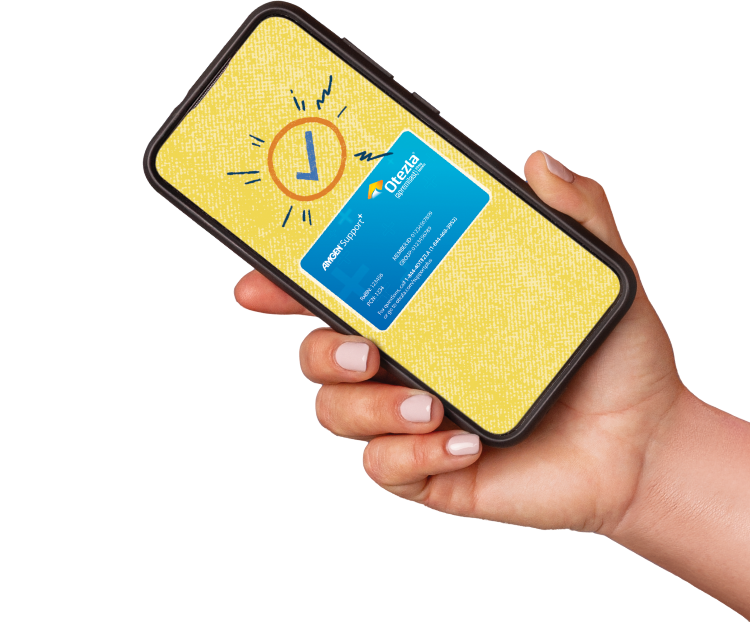Active Psoriatic Arthritis:
Active Psoriatic Arthritis:
Plaque Psoriasis:
Oral Ulcers Associated with Behçet’s Disease:
Otezla was studied compared to placebo (sugar pill) among 207 adults with oral ulcers in Behçet’s Disease. The most common side effects were:
| Most common side effects (up to week 12)* | Otezla (104 people) | Placebo (103 people) |
|---|---|---|
| Diarrhea | 41% | 20% |
| Nausea | 19% | 11% |
| Headache | 14% | 11% |
| Upper respiratory tract infection | 12% | 5% |
| *The titration period was days 1-5, during which the dose was gradually increased until the recommended dose of 30 mg twice daily was reached. | ||
All medications come with some risk of side effects. These side effects usually occur during the first few weeks of treatment and tend to go away as you keep taking it.
These are not all the possible side effects. Ask your doctor about potential side effects, and let them know about any side effect that bothers you or doesn’t go away.
Did you know you may be eligible to pay as little as $0* out-of-pocket per month with the Otezla Co-Pay Program if you have commercial insurance? Your co-pay can be applied to deductible, co-insurance, and co-payment, and is available regardless of your income level.
First-time co-pay card user? Find out more.
No insurance? Learn more about accessing your Otezla prescription.
*For commercially insured patients only. Eligibility criteria and program maximums apply.
See AmgenSupportPlus.com/copay-terms for full Terms and Conditions.


Behçet’s Disease is a rare inflammatory disease that can affect multiple parts of your body. The symptoms of Behçet’s Disease are different for different people, so it can be hard for doctors to diagnose. There is no cure for Behçet’s Disease, but it can be managed with medication. Otezla is the only pill approved to treat oral ulcers in Behçet’s Disease.
Oral ulcers are one of the main symptoms of Behçet’s Disease.
They are usually painful and can interfere with everyday activities like
eating, drinking, and speaking. A few other Behçet’s Disease symptoms to
watch out for with your doctor are genital ulcers, eye inflammation,
skin lesions, joint pain, blood vessel inflammation, brain inflammation,
and digestive tract ulcers.
It’s believed that Behçet’s Disease has to do with inflammation inside the body.
Exactly how Otezla works in people with Behçet’s Disease isn’t completely understood, but here’s what we do know:
Otezla is available as a 30 mg twice-daily pill or as a 75 mg Extended-Release once-daily pill.
Talk to your doctor to explore which formulation is the right option for you.
Otezla Extended-Release 75 mg pills are approved for:
Otezla Extended-Release pills are not recommended for patients with severe kidney disease.
Talk to your doctor if you are currently taking Otezla 30 mg twice-daily and are interested in switching your prescription to Otezla Extended-Release once daily.
Be sure to take as directed by your doctor. Find out more about getting your prescription.
Once your doctor prescribes Otezla or Otezla Extended-Release, you can get started with a titration pack right away: with no blood work or routine lab testing required.§
Your doctor may send you home with a 14-day treatment initiation pack.** With this, you will slowly increase your treatment dose until you reach the recommended dose. This is known as titration.
Titration is meant to help reduce the stomach and digestive side effects (nausea and diarrhea) that may occur when starting Otezla.
Once you have completed your titration pack as instructed by your doctor, you will then continue with either your Otezla 30 mg twice-daily, or Otezla Extended-Release 75 mg once-daily prescription.
People with severe kidney disease will follow a different schedule for Otezla. Otezla Extended-Release tablets are not recommended for people with severe kidney disease. Be sure to take your medication as directed by your healthcare professional.
See the titration details on Otezla below:
| Day 1 | Day 2 | Day 3 | Day 4 | Day 5 | Day 6 & Beyond | ||
|---|---|---|---|---|---|---|---|
| AM | 10 mg | 10 mg | 10 mg | 20 mg | 20 mg | 30 mg |
Or 75 mg Otezla Extended- Release |
| PM | — | 10 mg | 20 mg | 20 mg | 30 mg | 30 mg | |
When taking Otezla Extended-Release, you may sometimes see part of the tablet in your stool. This is not a cause for concern, this is the outer shell of the tablet. By the time you see it, the medicine inside has already been absorbed by your body.
Talk to your doctor about any side effects that bother you or do not go away. They may be able to suggest ways to manage them.
§Otezla Extended-Release once-daily dosing starts after initial titration with Otezla.
**Treatment initiation pack can be 14-day or 28-day, you should use the pack as instructed by your doctor.
If you miss a dose, contact your healthcare provider to determine the most appropriate next steps.


Amgen® SupportPlus can help with financial support and insurance coverage information for Otezla.
Do not take Otezla 30 mg tablets or Otezla XR 75 mg extended-release tablets if you are allergic to apremilast or to any of the ingredients in Otezla/Otezla XR
Otezla/Otezla XR can cause serious side effects, including:
Some medicines may make Otezla/Otezla XR less effective and should not be taken with Otezla/Otezla XR. Tell your doctor about all the medicines you take, including prescription and non-prescription medicines.
The most common side effects include diarrhea, nausea, upper respiratory tract infection, tension headache, and headache. These are not all the possible side effects with Otezla/Otezla XR. Ask your doctor about other potential side effects. Tell your doctor about any side effect that bothers you or does not go away.
Tell your doctor if you are pregnant, planning to become pregnant or planning to breastfeed.
You are encouraged to report negative side effects of prescription drugs to the FDA. Visit www.fda.gov/medwatch, or call 1-800-332-1088.
Please click here for the Full Prescribing Information for Otezla/Otezla XR.
Prescription Otezla® /Otezla XRTM (apremilast) is used for the treatment of:
Active Psoriatic Arthritis:
Plaque Psoriasis:
Oral Ulcers Associated with Behçet’s Disease:
Do not take Otezla 30 mg tablets or Otezla XR 75 mg extended-release tablets if you are allergic to apremilast or to any of the ingredients in Otezla/Otezla XR.
Otezla/Otezla XR can cause serious side effects, including: